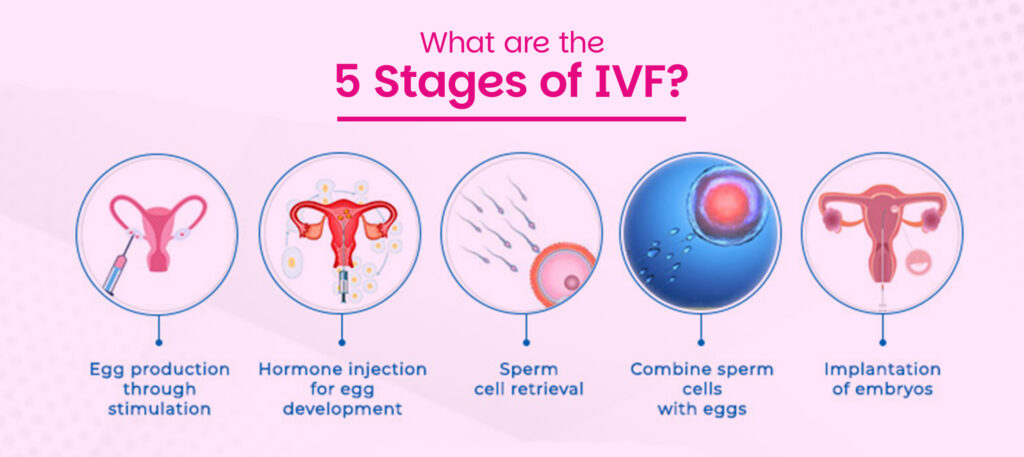In vitro fertilization (IVF) is a beacon of hope for couples struggling with infertility. While the process includes several steps — from ovarian stimulation to embryo transfer — one stage plays the most critical role in determining IVF success.
In this comprehensive guide, the fertility experts at Vrinda Fertility Centre, Delhi, explain what the 5 stages of IVF are, which stage is the most important, why it matters, and how you can optimize your chances of success.
Whether you’re researching IVF for the first time or preparing for your next cycle, this blog will help you gain clarity and confidence about the journey ahead.
The IVF Process at a Glance
Before we highlight the most important stage, let’s briefly outline what are the 5 stages of IVF?
Stage 1: Ovarian Stimulation (10–14 days)
Goal: Safely grow multiple mature follicles to collect several eggs.
How it works:
- Daily gonadotropin injections stimulate the ovaries.
- You’ll have 2–4 ultrasound scans and blood tests to track follicle growth and estradiol.
- A “trigger shot” (hCG or GnRH agonist) is given when follicles reach optimal size to mature the eggs.
What you’ll feel: Bloating, mild pelvic pressure, temporary mood/swings.
Pro tips:
- Take injections at the same time daily; never skip monitoring scans.
- Hydrate, moderate activity, avoid high-impact exercise.
- Tell your doctor if you feel severe pain or breathlessness (to rule out OHSS).
Stage 2: Egg Retrieval (Oocyte Pick-Up; ~20–30 minutes)
Goal: Collect mature eggs from each ovary right before they’re released.
How it works:
- Performed 36 hours after the trigger under light anesthesia.
- A thin needle gently aspirates follicles under ultrasound guidance.
- You rest for 1–2 hours in recovery and can usually go home the same day.
What you’ll feel: Cramping or spotting for 24–48 hours.
Pro tips:
- Arrange a caregiver/ride home.
- Eat light, avoid strenuous activity for 1–2 days.
- Follow antibiotic/pain relief instructions precisely.
Related terms: oocyte pick-up, egg collection, IVF procedure in Delhi.
Stage 3: Fertilization & Embryo Culture (Days 1–5)
Goal: Create healthy embryos and select the best one(s) for transfer.
How it works:
- Fertilization: Either conventional IVF (eggs + washed sperm) or ICSI (single sperm injected into each mature egg).
- Embryo checks:
- Day 1: Confirm fertilization.
- Days 2–3: Cleavage-stage (4–8 cells).
- Days 5–6: Blastocyst (more advanced embryo with higher implantation potential).
- Embryos are cultured in carefully controlled lab conditions; top-quality embryo(s) are chosen for transfer or freezing.
What drives success: Egg and sperm quality, lab standards, and skilled embryology.
Pro tips:
- Discuss blastocyst transfer, freezing (vitrification), and the number of embryos to transfer (to minimize multiples).
- Consider recommended tests (e.g., semen DNA fragmentation) if indicated.
Semantic/LSI terms: embryo grading, blastocyst culture, ICSI, embryo quality, IVF lab.
Stage 4: Embryo Transfer (Painless, ~10 minutes)
Goal: Place the healthiest embryo into a receptive uterus.
How it works:
- A soft catheter passes through the cervix to deposit the embryo in the uterine cavity.
- No anesthesia needed; you’re awake and can watch the process on ultrasound.
- Luteal support (progesterone) continues to help the lining stay receptive.
What you’ll feel: Usually mild discomfort; resume light activity the same day.
Pro tips:
- A gentle, precise transfer matters; relax your abdominal muscles and follow pre-transfer bladder instructions.
- Continue medications exactly as prescribed—do not stop early.
Related terms: embryo implantation, single embryo transfer, progesterone support, IVF success in Delhi NCR.
Stage 5: Pregnancy Test (β-hCG) & Follow-Up (10–14 days post-transfer)
Goal: Confirm implantation and early pregnancy.
How it works:
- A β-hCG blood test is performed ~10–14 days after transfer.
- If positive, repeat tests and an early ultrasound (~6–7 weeks) to confirm gestational sac and heartbeat.
- If negative, your doctor reviews the cycle to plan next steps (frozen transfer, protocol changes, additional tests).
Pro tips:
- Avoid at-home tests too early to prevent confusion.
- Keep taking medications until your clinic advises otherwise.
Related terms: IVF two-week wait, β-hCG levels, early pregnancy scan.
Each step plays a vital role, but embryo development and selection are widely regarded as the “make-or-break” phase of IVF success.
The Most Important Stage of IVF: Embryo Development & Selection
Why Embryo Development Matters Most
The embryo stage is where science meets nature. While stimulation and retrieval are critical, the quality of the embryos determines the likelihood of successful implantation and pregnancy.
Factors influencing embryo development include:
- Egg Quality: Directly affected by maternal age, ovarian reserve, and stimulation protocols.
- Sperm Quality: Determines fertilization success and the genetic health of the embryo.
- Lab Culture Conditions: Temperature, pH, and embryologist expertise in the lab.
- Genetic Integrity: Chromosomal health is crucial for embryo viability.
A healthy, chromosomally normal embryo increases the chance of implantation and reduces the risk of miscarriage.
Expert Insights from Vrinda Fertility Specialists
According to Dr. Anushka Madan, Senior IVF Specialist at Vrinda Fertility, Delhi:
“Embryo quality is the cornerstone of IVF success. While every stage is crucial, even the most skilled transfer won’t succeed without a healthy, viable embryo. Therefore, we focus on personalized stimulation protocols, precision in egg retrieval, and cutting-edge lab techniques to create and select the best embryos for our patients.”
This highlights the importance of a holistic approach where all stages complement each other, but embryo development and transfer remain the most critical points.
Tips to Improve Success During the Critical Stages
- Choose an Experienced Clinic: Look for a clinic with advanced lab facilities and high blastocyst culture rates (like Vrinda Fertility).
- Optimize Egg & Sperm Health: Maintain a healthy weight, avoid smoking/alcohol, manage chronic conditions, and take prescribed fertility supplements.
- Follow Medication Protocols Strictly: Timely injections and medications are key to producing quality eggs.
- Reduce Stress: Stress hormones can affect hormonal balance and implantation.
- Trust the Process: Communicate openly with your fertility specialist and follow their advice closely.
IVF in Delhi: Why Choose Vrinda Fertility
Vrinda Fertility has emerged as one of the most trusted names for IVF treatment in Delhi and Noida.
Why couples choose Vrinda Fertility:
- State-of-the-art embryology lab with time-lapse incubators and advanced blastocyst culture.
- Experienced IVF specialists with over 20 years of clinical expertise.
- Personalized treatment protocols tailored to individual patient needs.
- High success rates in difficult cases, including recurrent IVF failures and advanced maternal age.
- Patient-centric care with emotional support throughout the journey.
For couples in Delhi NCR seeking IVF near Ashok Vihar, North Delhi, or Noida, Vrinda Fertility provides compassionate, evidence-based treatment.
Conclusion: Focus on Quality for IVF Success
Every step in IVF — from ovarian stimulation to transfer — plays an important role, but the embryo development and selection stage holds the key to success.
At Vrinda Fertility, Delhi, we combine cutting-edge technology, experienced embryologists, and compassionate care to maximize success rates for couples facing infertility challenges.
If you’re planning IVF in Delhi or Noida, consult our specialists at Vrinda Fertility for expert guidance and personalized treatment plans.
Frequently Asked Questions (FAQ)
The most important stage of IVF is embryo development and selection, as the quality of embryos directly impacts implantation and pregnancy success rates.
Follow your doctor’s recommendations for a healthy lifestyle, take prescribed fertility medications, and ensure both partners undergo pre-IVF testing to address underlying issues.
Both are critical, but without a high-quality embryo, even a perfect transfer will not succeed. Hence, embryo development and quality are paramount.
A pregnancy test (β-hCG) is usually done 10–14 days after embryo transfer to confirm successful implantation.
Maternal age, ovarian reserve, sperm quality, lab conditions, and overall health of both partners significantly influence embryo quality.



